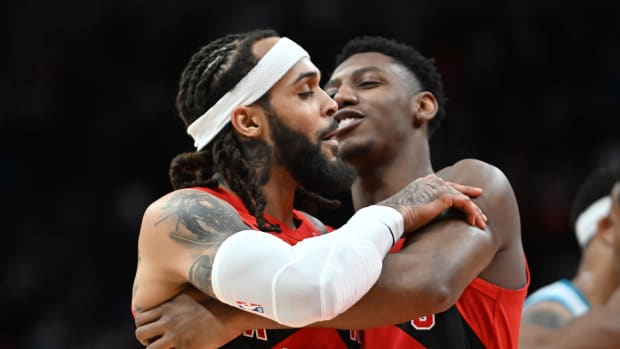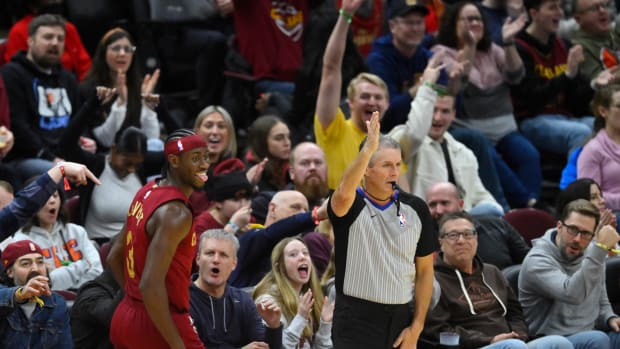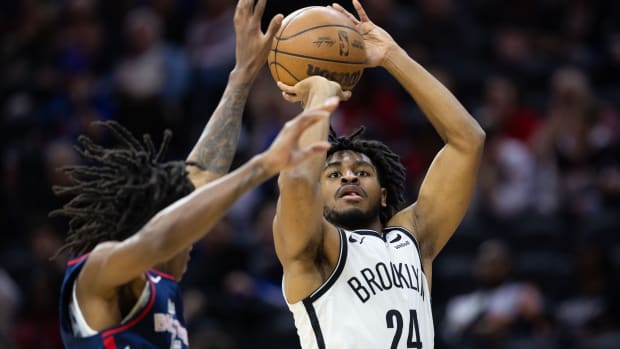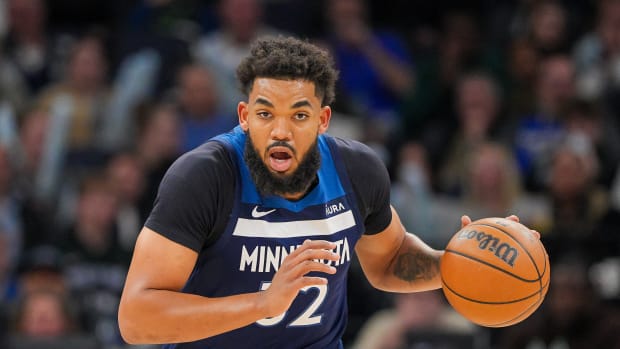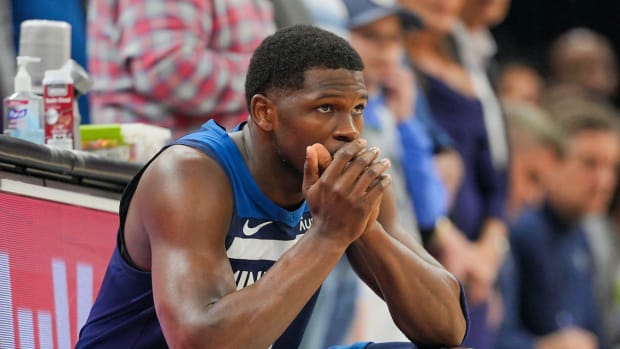NBA playoff preview: Heat-Raptors should provide another East slugfest
Get all of Jeremy Woo's columns as soon as they’re published. Download the new Sports Illustrated app (iOS or Android) and personalize your experience by following your favorite teams and SI writers.
Matchup: (2) Toronto Raptors vs. (3) Miami Heat
Season series: 3–1 Raptors
Toronto’s efficiency rankings (Off: 5, Def: 11, Net 6)
Miami’s efficiency rankings (Off: 12, Def: 7, Net: 10)
Toronto’s playoff efficiency rankings (Off: 11, Def: 8, Net 10)
Miami’s playoff efficiency rankings ( Off: 6, Def: 4, Net. 4)
The Matchup
The allure of playoff chalk has been whitewashed to a degree by seven-game first-round slugfests that unmasked the sizable flaws of both sides. Nevertheless, here are the Raptors and Heat, North Side and South Beach, second seed and third creating a best-case scenario as far as intrigue goes. Toronto enters breathing ample relief, surviving a difficult matchup with Indiana and advancing to the East semifinals for the first time in 15 years—and just the second in franchise history. Miami held on against a high-quality Charlotte team, taking plenty of knocks in the process but finishing on a convincing note. This is the first-ever postseason meeting between the teams, and from an emotional standpoint both can certainly appreciate a clean slate, temporary as it will be.
Neither team’s first-round series produced especially sexy basketball, and if that’s your cup of tea, then cast your attention West and keep the kettle hot for some long nights. Expect more physical, defensive contests and fewer shootouts, particularly if Toronto’s shooting struggles persist. Kyle Lowry’s injured right elbow has quietly sapped the effectiveness of his jumper and DeMar DeRozan’s first-round struggles actually necessitated heavy shot volume, so reliant are these Raptors on their All-Star backcourt. The duo, each shooting 31% over seven playoff games, will be sorely needed to operate at a more functional clip lest their team make an early, frustrating exit. Lowry and DeRozan finished first and second among Raptors in regular-season points, assists and minutes per game, and Toronto’s offensive output is hamstrung when they’re off: 39% overall playoff shooting slots them last among the eight remaining contenders.
• MORE NBA: 10 memorable moments | Playoffs get real: Spurs-Warriors
A realistic scenario in which those issues continue leaves the door wide open for the Heat, who are fresh off a Game 7 demolition of the Hornets and back in the postseason for the first time since LeBron James skipped town. The possibility of a rematch with their ex-maestro, whose Cavs sit on the other side of the bracket, certainly has the league’s television brass jacked up. There’s not a chance it hasn’t crossed Dwyane Wade’s mind. But the Heat are a fundamentally different team since we last saw them this deep in the postseason, sans James and also former Raptor Chris Bosh, who barring a shocking turn will stay sidelined as the team monitors his health. Erik Spoelstra has a unique set of tools to play with: the Heat can adequately line up big and small and has effectively diversified its attack the past couple of months, necessitated by the loss of Bosh. Losing three straight to the Hornets could scare them into the greater degree of consistency they’ll need to advance.
The current tides, as well as the talent gap, appear to favor the Heat, who will have to steal a game north of the border to advance. The uncertainty surrounding Lowry’s scoring impact places added impetus on the Raptors’ supporting cast. Both teams have already won road games and closed out tight ones, and it all portends a series that could take most of the allotted two weeks’ time to resolve.
The case for: The Raptors
Whichever team dominates the paint on both ends will maximize its chances to win this series, and that rings more crucial for Toronto, which makes much of its money at the rim. The Raptors averaged a league-high 23 points per game when attacking the basket, leaning on DeRozan and Lowry and bolstered by Cory Joseph off the bench. Pacers were able to cut DeRozan’s regular-season off-the-drive scoring average (a league-high 8.7 points per game) in half, forced him into pull-up situations (on which he shot just 27%) and kept him off the free-throw stripe entirely in two of seven games.
The Heat have the requisite personnel to do the same, and the Raptors will have to stay crisp and put their stars in better positions to succeed to survive another round. The more Lowry struggles, the more the Raptors will lean on DeRozan for offense, and he will likely need to be the best player in this series more often than not. The good news? He averaged 29.3 points over four matchups against the Heat, dropping 38 in the most recent meeting (which, notably, Dwyane Wade sat out). He dropped 30 on 32 shots in game seven, which, ugly as it was, got the job done.
• NBA playoff previews: Warriors vs. Blazers | Cavaliers vs. Hawks
The reliance on Lowry and DeRozan initiating play sometimes necessitates iso-ball, but Toronto will benefit greatly if it can move away from that, space the floor and get its role players involved early on. Joseph (69% true shooting) was terrific in the first round, and rookie find Norman Powell made several critical contributions. Jonas Valanciunas was stellar, averaging a double double and a ridiculous five (!) offensive rebounds per game. He’ll have his hands full much of the time with Hassan Whiteside and need every bit of strength and guile to win the matchup, but can be a galvanizing force. If the Raptors’ perimeter shooting (28.2%) improves and they maximize available driving lanes, the offensive output should correct enough to make a difference. When they need to score late in games, they’ll need a better solution than pounding the ball for 15 seconds before hoisting a wayward shot.
Defensively the asks will be different, and Toronto would appear to match up better in this round. Where the Pacers were able to field three tricky perimeter threats at once, Wade and Goran Dragic are Miami’s only two true creative threats off the dribble, and the Heat stuck entirely to one-big lineups, using Luol Deng and noted Raptors-killer Joe Johnson as stretch forwards. The Raptors have a slew of defensive options on the perimeter in DeMarre Carroll, Powell and Terrence Ross, which should allow them to keep DeRozan locked onto floor-spacers, reduce his defensive work rate and save some energy.
• MORE NBA: Raptors exorcise postseason demons in Game 7 win
Lowry and Dragic were teammates years ago in Houston and know each other’s capabilities well. Joseph has proven useful on the defensive end. Hassan Whiteside can be difficult to deal with on the offensive glass and as a roll man, but Miami lacks a serious post-up threat to challenge Jonas Valanciunas and Bismack Biyombo. The Pacers deployed two able rim-protecting bigs in Ian Mahinmi and Myles Turner and always had one on the floor, whereas the Heat have only Whiteside, leaving bench minutes for Josh McRoberts that the Raptors will badly need to win. Even if their offense continues to stagnate, concerted defensive effort can keep them around, provided they keep a handle on the pace of play and cover shooters effectively. And with the pressure of escaping the first round gone and a devoted fan base behind them, Toronto’s advantage at home could be a serious factor.
The case for: The Heat
Though the Raptors earned home-court with consistently solid regular-season play, after the All-Star break, the Heat were the better team by the numbers. Miami was just a tenth of a point behind Toronto in offensive efficiency and 1.7 points better defensively. This is the only sample with which to fairly look at the Heat, which successfully adopted pace-and-space play in the second half without Bosh to lean on and run plays for. After the break, it transformed from the NBA’s third-worst three-point shooting team to a respectable one (36.5%), with rookie Josh Richardson emerging as a dangerous long-range threat (53.3%) as his minutes doubled. The entire rotation took an offensive uptick, the defense stayed in the top 10, and the Heat led the league in field goal percentage the rest of the way.
Miami boasts more big-game experience (see Wade, Johnson and a resurgent Luol Deng), but is also uniquely wet behind the ears, featuring rookies Richardson and Justise Winslow prominently. Try and name a playoff team that’s ever relied this heavily on two first-year players, and you probably can’t. In that sense, seven games against the Hornets may have been a necessary test for this group, even if it took a throwback Game 6 from Wade on the road to avoid a complete collapse. The execution got spotty and the well ran dry offensively in the middle of the series. But even with their warts, the Heat has the personnel to somewhat replicate the Pacers’ recipe for success against the Raptors.
Heat's Game 7 blowout win poses as potential breakthrough
In the first round, the Heat were the NBA’s best defensive team at the rim, limiting Charlotte to 40.4% on defended shots within five feet of the hoop. Largely responsible for that was the prowess of Hassan Whiteside, which we’ll get to in a second. Miami’s best bet is to pressure the ball, stay solid against the drive, take its chances with secondary shooters and force Toronto into extra ball rotations and uncomfortable late-clock looks. As long as Lowry’s at less than 100%, defending the pick-and-roll with Valanciunas is a far less threatening prospect. With Winslow a versatile ace in the hole, this team is good enough to take the series with focused defensive effort.
At the other end of the floor, a dominant Game 7 showing from Goran Dragic hinted strongly at an untapped offensive gear. The Heat took control early in the 33-point blowout as their highly variable ballhandler zipped around the floor and to the rim, operating in space and creating opportunities for the entire team. He looked very much like the guy Pat Riley envisioned when Miami dealt two first-rounders to Phoenix, looking to find Wade a backcourt partner and extend its post-LeBron window of contention. There have been questions about Dragic and Wade’s stylistic fit given their ball-dominant needs, but if the former’s outburst portends improved synergy from here, it would go a long way to stabilizing the Heat offense.
• MORE NBA: Wade's evil genius saves the Heat... again
Meanwhile, Deng is playing his best ball since his Chicago days, Johnson gives Miami another proven late-game option, and a return to the East finals appears within reach. Plus, we’re somewhat remiss to have come this far while mostly glossing over the presence of Wade: he’s still very much great and brings good health and a full bag of tricks to this series. Having a defined closer, especially a Hall of Fame one, never hurts.
The X-Factor: Hassan Whiteside
With irreplaceable size and length, Whiteside was effectively a one-man pick-and-roll antidote against Charlotte in Game 7, eliminating nearly every option on the inside simply with his presence. The Hornets opted to play small and had no suitable answer for him: Al Jefferson was bothered by Whiteside’s reach, and the center was able to sag back on screens, frustrate Cody Zeller and Frank Kaminsky and all but eliminate guard penetration.
Guess what? The Raptors have no real way to pull Whiteside away from the paint, with neither Valanciunas nor backup Bismack Biyombo serviceable as mid-range shooters. Toronto has an interesting decision to make as far as matchups go, and the optimal call may be to rotate in Biyombo early, trust him to keep Whiteside off the glass and let Valanciunas feast on McRoberts. Then again, Biyombo is essentially a complete non-factor offensively: the Pacers at times willingly allowed him to catch as a roll man, knowing a late-arriving big man or help defender would be enough to effectively contest his layups. Valanciunas brings a blend of interior strength, skill and athleticism the Heat have yet to see in these playoffs, but it’s easy to see Whiteside’s long arms erasing his impact enough to make it work. How the Raptors, already searching for solutions of their own on offense, deal with Whiteside could determine the course of the series. How the blossoming 7-footer affects things will certainly bolster his pending free agent payday.
The Pick
Heat in six. Though resilient, the Raptors stumble into this series with their two most vital players mired in slumps and their advantages contingent on what-ifs. The Pacers offered a useful blueprint for the Heat to take advantage, and if it can steal an early game on the road, it should take control of things. This shouldn’t be simple by any means, but Miami’s experience and well-rounded attack gives it an edge in close fourth-quarters, and ultimately the series.
































